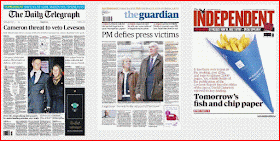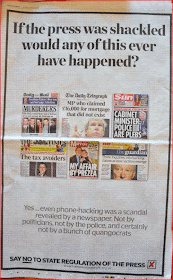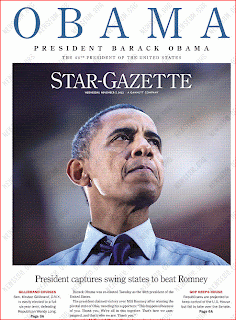Lord Justice Leveson (top) in his Report: "The evidence placed before the Inquiry has demonstrated, beyond any doubt, that there have been far too many occasions over the last decade and more (itself said to have been better than previous decades) when these responsibilities, on which the public so heavily rely, have simply been ignored. There have been too many times when, chasing the story, parts of the press have acted as if its own code, which it wrote, simply did not exist. This has caused real hardship and, on occasion, wreaked havoc with the lives of innocent people whose rights and liberties have been disdained. This is not just the famous but ordinary members of the public, caught up in events (many of them, truly tragic) far larger than they could cope with but made much, much worse by press behaviour that, at times, can only be described as outrageous."
Lord Justice Leveson in his Report: "In order to give effect to the incentives that I have outlined, it is essential that there should be legislation to underpin the independent self-regulatory system
and facilitate its recognition in legal processes."
Lord Justice Leveson in his Report: "Finally, I was struck by the evidence of journalists who felt that they might be put under pressure to do things that were unethical or against the code. I therefore suggest that the new independent self-regulatory body should establish a whistle-blowing hotline and encourage its members to ensure that journalists’ contracts include a conscience clause protecting them if they refuse."
Lord Justice Leveson in his Report: “In relation to regional and local newspapers, I do not make a specific recommendation but I suggest that the Government should look urgently as what action it might be able take to help safeguard the ongoing viability of this much valued and important part of the British press. It is clear to me that local, high-quality and trusted newspapers are good for our communities, our identity and our democracy and play an important social role.”
David Cameron in the House of Commons, as reported by BBC News, after saying he had "serious misgivings" about independent self regulation of the press being underpinned by law because: "We would have crossed the Rubicon of writing elements of press regulation into the law of the land, we should be wary of legislation that has potential to infringe free speech and a free press."
The Daily Mail in a leader: "To his enormous credit, however, David Cameron sees this report for what it is — a mortal threat to the British people’s historic right to know. If he prevails in protecting that right, with the help of like-minded freedom lovers in the Commons and Lords, he will earn a place of honour in our history."
The Financial Times in a leader: "While there may be merit in a grand bargain that trades the incentives to participate for some measure of statutory underpinning, the idea of handing oversight power to Ofcom is wrong-headed. Ofcom is charged with regulating television broadcasters that have a legal obligation to impartiality. It reports directly to government. This is a step down the road towards state licensing of a press that, of course, has no obligation to provide balance."
The Daily Telegraph in a leader: "The industry must act quickly to set up an independent regulatory body that fulfils the principles put forward by Leveson. If it does that, then Mr Cameron, Mr Clegg, Mr Miliband and Parliament should be able to stay on the right side of the Rubicon."
The Guardian in a leader: "While Lords Hunt and Black have done useful work in trying to draw up a reformed version of the discredited PCC, it is not clear that they are now the right people to be trying to build a consensus among a diverse group of editors, publishers and proprietors. Their past efforts confusingly married consultation with lobbying and they badly misjudged what would be acceptable, either to the inquiry or to Westminster."
The Sun in a leader: "We understand why phone hacking victims want newspapers muzzled. But anger and the desire for revenge are not a basis on which to destroy 300 years of Press freedom. That is why we applaud David Cameron’s courage in resisting Lord Leveson’s call for a new law, saying he has “serious concerns and misgivings” over legal underpinning for a new regulator. Parliament must now give the Press the chance to respond to Lord Leveson with its own proposals."
Adrian Jeakings, president of the Newspaper Society and chief executive of Archant, in a statement: "Local newspapers have always been vehemently opposed to any form of statutory involvement or underpinning in the regulation of the press, including the oversight by Ofcom proposed in the report. This would impose an unacceptable regulatory burden on the industry, potentially inhibiting freedom of speech and the freedom to publish."
Liberty’s director Shami Chakrabarti, one of the panel of assessors who advised Lord Justice Leveson, in a statement: “Leveson’s main proposal makes sense for the public, press and politicians alike. The press sets up a robust body – independent of Government and serving editors – and earns legal protections from needless challenges in court. The public gets confidence of greater access to justice and redress when things go wrong. What nobody needs and Liberty cannot support is any last-resort compulsory statutory press regulation – coming at too high a price in a free society.”
US-based Committee to Protect Journalists executive director Joel Simon in a statement: "A media regulatory body anchored by statute cannot be described as voluntary. Moreover, adopting statutory regulation would undermine press freedom in the U.K. and give legitimacy to governments around the world that routinely silence journalists through such controls."
Charles Moore in the Daily Telegraph: "In the nearly 20 years in which I edited various papers, including this one, I became ever more strongly convinced of two things. The first was that statutory regulation of the press was a bad idea. The second was that the self-regulation of the press was little better than a farce."
Times editor James Harding [£]: "Let’s not tiptoe around the problem. The British press has, on occasion, abused its power and influence, trampled on the feelings of the vulnerable and, sometimes with scant justification, intruded into people’s privacy. These excesses have, I believe, been the exception, not the stock-in-trade of Fleet Street. But they have undermined the reputation of journalists and destroyed confidence in regulation of the press."
David Yelland
@davidyelland on Twitter: "Will this week see the end of a free press? No. We
will find a way through the woods so long as editors show humility and
less arrogance."
The Observer in an editorial: "We may have to accept that the price of press freedom inexorably involves sometimes getting things wrong – as well as some right. The question we have to ask is: if we choke that freedom away by law, and then by adding more and more law for every mistake, what freedom will there be left?"
Dan Sabbagh in the Guardian: "There is, behind the scenes, an almost comic attempt to get all the newspaper groups to sign up to some sort of statement on regulatory reform. But it would be easier to get 10 cats to sashay down Oxford Street in a straight line."
Spectator editor Fraser Nelson in a leader: "If the press agrees a new form of self-regulation, perhaps contractually binding this time, we will happily take part. But we would not sign up to anything enforced by government. If such a group is constituted we will not attend its meetings, pay its fines nor heed its menaces. We would still obey the (other) laws of the land. But to join any scheme which subordinates press to parliament would be a betrayal of what this paper has stood for since its inception in 1828."
Emily Bell on the Guardian's Comment is Free: "Leveson deals with the nefarious ways of publishing personal information; it deals with the fallout of incestuous relationships run from the heart of government; and it deals with the personal cost of people crushed by journalism-as-showbusiness. What it cannot deal with is the regulation of the press in the 21st century."
Non-Leveson Quote of the Week:
Lord Patten on what the BBC Trust conveyed to George Entwistle, as reported by the BBC: "We are not urging you to go. But we are not urging you to stay."
[£] = paywall
























